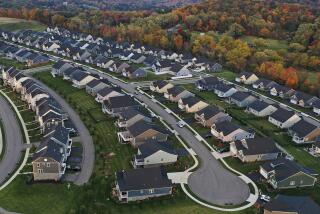Editorial: What homeless crisis? HUD Secretary Ben Carson wants to raise rents on the poorest of the poor
On Tuesday, Housing and Urban Development Secretary Ben Carson was on L.A.âs skid row touring a womenâs shelter and praising Los Angeles for its ambitious efforts to end homelessness. On Wednesday, Carson proposed new laws that could make it much more difficult to do just that.
Carson unveiled the Making Affordable Housing Work Act of 2018, a proposed bill that could force the very poorest tenants receiving federal aid â those most likely on the edge of homelessness â to pay three times as much in rent. It would also shrink the rent subsidies received by other low-income Americans, leaving them with less money for food, medical expenses and education. And it would allow local public housing authorities to impose work requirements on people receiving housing assistance.
The proposal is part of a larger Trump administration push to cut funding for and add work requirements to a range of social safety net programs, including Medicaid and food assistance, ostensibly to help more people climb out of poverty. The administration had previously sought to slash funds for affordable housing programs, but Congress restored the money when it passed the budget last month.
We canât imagine someone visiting skid row and then proposing to make it harder to house the most downtrodden men and women.
Congress isnât likely to back Carsonâs new plan, either â lawmakers surely recognize that cities across the country are experiencing an affordable housing and homelessness crisis. The cost of housing has outpaced income growth in many metropolitan areas. HUDâs housing safety net is vitally important in keeping families off the street, yet itâs woefully underfunded â roughly three-fourths of the families who qualify for rent subsidies are stuck on waiting lists, where they may remain for years.
Carsonâs answer to that problem is to make poor people pay more and work more.
Under the current rules for federal rental assistance, non-elderly, non-disabled renters have to pay 30% of their income after deducting child care and medical expenses. The proposal would boost their rent to 35% of gross income, allowing no deductions. That could significantly increase how much families, particularly low-wage working parents with young children, pay toward their rent.
The proposal would also boost the minimum rent that the poorest of the poor pay. Currently non-elderly, non-disabled renters must pay at least $50 a month toward their housing; the bill would boost that to $150 a month â a sum that would consume, for example, two-thirds of the monthly âgeneral reliefâ check that some homeless people in Los Angeles County rely on. The HUD proposal would also create a new, minimum rent of $50 for elderly and disabled renters.
HUD also wants to let public housing agencies and landlords who accept federal subsidies set work requirements for non-elderly, non-disabled renters, or about half of those receiving subsidies. But just 6% of households receiving assistance include able-bodied adults who are not working and not caring for young children or dependents with disabilities, according to the National Low Income Housing Coalition. So there is hardly an epidemic of slouches living off public housing dollars.
Carsonâs proposal is slap-dash attempt to enact reforms that have been floated for years, some of which are being piloted by HUD right now. There are long-standing, bipartisan complaints that HUDâs subsidy program is too bureaucratic and hard to navigate. There is also concern that the program discourages individuals from working more or earning more money, for fear theyâll lose their rental assistance.
HUD has a study underway to figure out whether simplifying income requirements and verifying eligibility less frequently would give families a financial cushion if they begin to earn more. There are also local public housing agencies experimenting with work requirements. The goal of these experiments is to streamline processes and move more poor renters toward greater self-sufficiency without hurting families or whittling away the safety net.
Rather than wait for the results of those studies or use data from other research to guide proposed reforms, however, Carson and the Trump administration are plowing ahead with changes that weaken the safety net they were entrusted to protect.
When Carson toured skid row this week, he told reporters, âI canât imagine how anybody could walk through an area like this and not have their heart strings tugged.â We canât imagine someone visiting skid row and then proposing to make it harder to house the most downtrodden men and women. And yet, here we are.
Follow the Opinion section on Twitter @latimesopinion and Facebook
More to Read
A cure for the common opinion
Get thought-provoking perspectives with our weekly newsletter.
You may occasionally receive promotional content from the Los Angeles Times.










